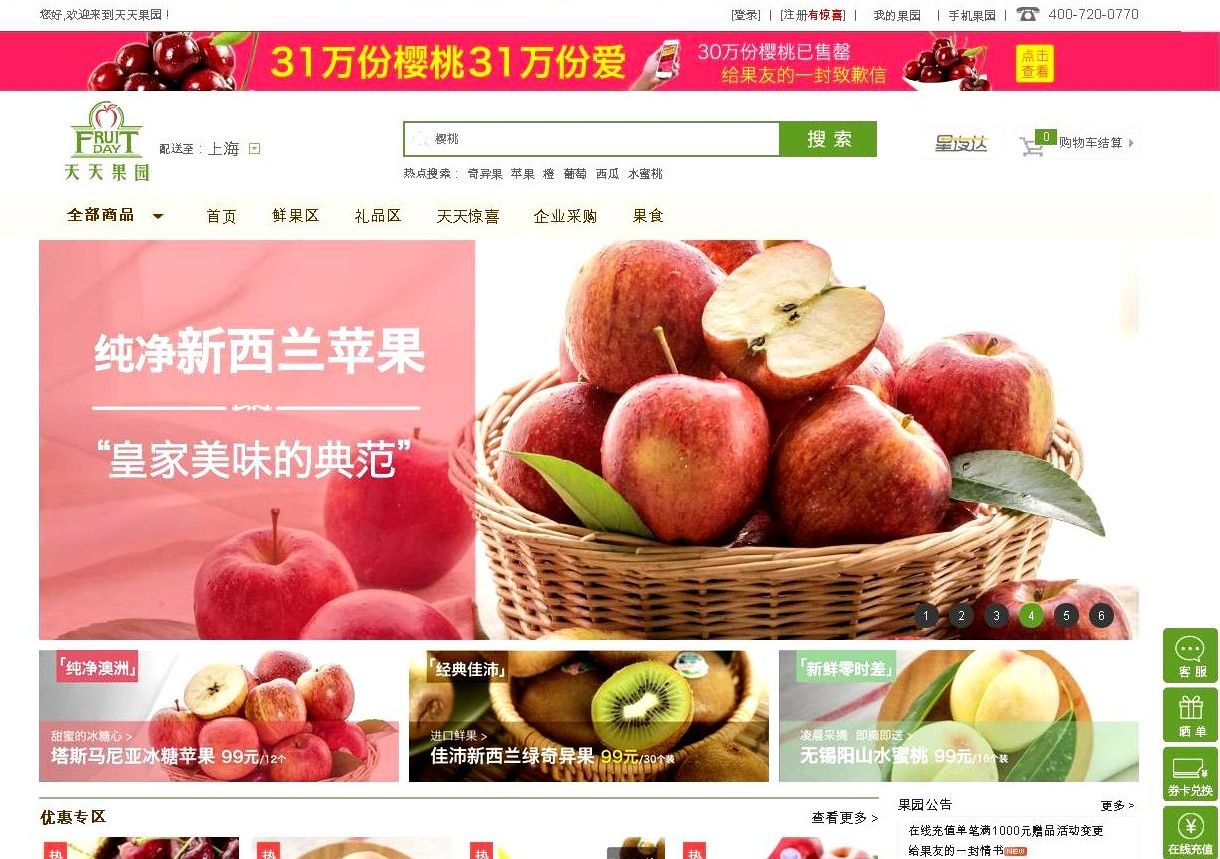E-commerce giant JD.com announced that it led a $70 million Series C funding in FruitDay, a Chinese-based online retailer providing a wide variety of fresh fruits and vegetables. Part of this figure includes participation from prior investors ClearVue and Susquehanna International Group. Online retail has become a burgeoning market in over the last decade, with more and more companies focusing their sites on business-to-consumer, or B2C, transactions. B2C platforms offer buyers a non-shop retailing experience with convenient mail delivery services.
FruitDay opened its digital doors in 2009 and has since grown to become one of China’s largest online retailers. The company imports eighty percent of its produce from overseas, and expects to hit ten million customers before the end of 2015. If successful, this would constitute a fourfold increase from FruitDay’s 2014 figures. With consumers becoming increasingly concerned about getting enough fresh fruits and vegetables, a quick and easy way to add fresh produce to the refrigerator is in high demand. FruitDay plans to use this funding to develop logistics and infrastructure, bring aboard new management, and generate new business development opportunities.
The company has agreed to “a strategic cooperation” with JD.com, allowing it to benefit from JD’s existing Chinese-based fulfillment network and logistical support. Many people compare JD.com with Alibaba, which set the record for the United State’s largest IPO in 2014. Alibaba holds itself out as the world leader in wholesale trade, and claims to serve millions of buyers and suppliers around the globe. The company provides suppliers with a variety of tools that can assist them with increasing their global audience, and assists buyers with finding the right products and suppliers on a quick and efficient timeline. According to its website, Alibaba offers forty categories of products and services across 190 countries and hosts an exchange of over 100,000 messages a day. Based on these figures, many suggest that JD.com is operating in Alibaba’s rather impressive shadow.
Alibaba’s current market cap may exceed $230 million, but JD.com boasts some critical features that Alibaba lacks. Initially operating under the name 360Buy and later changing its name to Jingdong Mall in 2007, the company is currently listed on the Nasdaq. As its most key differentiator, JD.com has drawn investment deals from Tencent, one of Alibaba’s rivals. In 2014, Tencent acquired a 15 percent stake in JD.com, handing over a cash payment and a number of its e-commerce businesses, including QQ Wanggou, Paipai, and Yixun. Tencent said that it made the deal in an effort to create strong competition for Alibaba, considering it a major competitor.
Today, JD.com’s business strategy involves rolling out an Amazon-like delivery system featuring its own full-scale warehouse spaces. Alibaba’s operations platform is a bit different, focusing more on connecting sellers and buyers than facilitating the actual transaction. JD.com purchases goods directly from manufacturers and holds the inventory in its warehouse system until a buyer has been secured. JD.com has figured out how to provide quick delivery for a wide selection of its inventory, including clothes and appliances. Using a fleet of motorbikes, JD.com distributes purchases through China’s bustling cities at a rapid pace. It probably won’t be too difficult or costly to equip some of these warehouses with a refrigeration system and to transport fresh produce on the back of JD.com’s motorbikes.
JD.com also has a leg-up when it comes to reaching its potential consumer base. Tencent owns WeChat, China’s most popular messaging app. JD.com already enjoys a strong presence on WeChat, currently operating a digital store that allows chatters to make purchases without leaving the app. It may not be long before fresh fruit and vegetables are offered among the digital mall giant’s current wares.
Alibaba doesn’t have its head in the sand when it comes to realizing JD.com’s potential. Alibaba’s affiliate, the China Smart Logistics Network (CSN), boasts its own logistical network and is working toward providing a 24-hour delivery service throughout China.
To date, JD.com has also enjoyed widespread recognition for its entrepreneurial endeavors. In December 2011, the company’s founder, Liu Qiangdong, earned the title of “CCTV Economic Person of the Year in China.” The company went on to earn Fortune Magazine’s best Employer of 2011 award for the Chinese domain, and was later included on the “List of Model e-Commerce Companies” by the Ministry of Commerce.
According to Haoyu Shen, a leader with JD.com’s Mall business, “By combining JD.com’s online e-commerce platform and nationwide logistics infrastructure with FruitDay’s vertical leadership, more and more Chinese consumers nationwide will have the ability to purchase safe and healthy fresh produce online with confidence.” When it comes to exploring new opportunities, Shen sees JD.com taking a proactive approach: “As we build China’s premier online e-commerce platform, JD.com will continue to explore long-term partnerships with leaders in key vertical markets.”
Have news or tips? Email [email protected].





